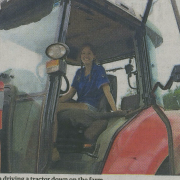Vicky Smith (2013). How the worm was turned by Colman’s
A popular spicy condiment has been used in a Harpenden woman’s research project – to gauge the number of earthworms in ploughed soil. By mixing Colman’s Mustard powder with water and putting the solution onto the ground, Victoria Smith, 22, has established that the less mechanical disturbance of soil, the better the environment to produce an abundance of the invertebrate.
Although a townie at heart – Victoria comes from a non-farming background with little previous knowledge of the industry – she has recently received the 2016 British Society for Soil Science Award.
After enjoying a work experience stint at Will Dickinson’s Cross Farm in Harpenden, Victoria uccessfully applied to Harper Adams University in Shropshire, where she has completed a BSc Hons agriculture and environmental management.
She received the science award for her dissertation on “The effect of tillage depth and compaction level on earthworm density” which investigated the impact of various farming methods on earthworm numbers.
Victoria describes earthworms as an important ‘ecosystem engineer’ as their presence improves soil conditions, leading to improved crops and soil sustainability. Previous investigations have shown that increased mechanisation in the agricultural industry can have negative effects on earthworms – described by Greek philosopher Aristotle as ‘the intestines of the earth’. But before she began her study, Victoria considered how she could actually extract the earthworms in the first place, to accurately gauge their numbers. One way is to use formalin.
However, this is potentially toxic for the environment and human health – not to mention the invertebrates themselves. Instead, Victoria used an application of hot mustard solution, involving
Colman’s Mustard and water, which has no adverse negative effects on earthworms or the surrounding environment. The mustard solution is applied to the soil surface, which irritates the earthworms and leads them to the surface. After drawing nearly 600 from the ground, Victoria found that to increase earthworm density, less intensive tillage systems should be used. Zero tillage, a system of farming in which planting is done in a narrow trench without tillage, is more beneficial for worms and helps increase their density. She concluded that her results “emphasise how sensitive earthworms are to increased tillage depth”. Victoria said that shallow and deep tillage – such as by plough – did not create healthy soil environments suitable for earthworm activity “and therefore are not advised as a technique to increase density”. Other research has shown a strong correlation in improved soil structure, water drainage and organic matter where there is an abundance of earthworms.
Since graduating, Victoria has travelled to Esperance in Western Australia with several friends from university to experience farming on the other side of the world.
Article reproduced from the Herts Advertsier. By Debbie White debbie.white@hertsad.co.uk







